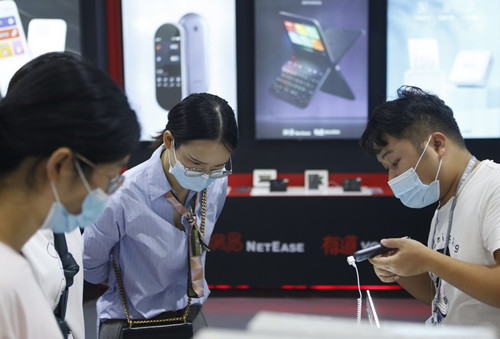
- Home
- Media Center
-
Events
- Wuzhen Summit
- Regional Forums
- Practice Cases of Jointly Building a Community with a Shared Future in Cyberspace
- World Internet Conference Awards for Pioneering Science and Technology
- The Light of Internet Expo
- Straight to Wuzhen Competition
- Global Youth Leadership Program
- WIC Distinguished Contribution Award
- Membership
- Research & Cooperation
- Digital Academy
-
Reports
- Collection of cases on Jointly Building a Community with a Shared Future in Cyberspace
- Collection of Shortlisted Achievements of World Internet Conference Awards for Pioneering Science and Technology
- Reports on Artificial Intelligence
- Reports on Cross—Border E—Commerce
- Reports on Data
- Outcomes of Think Tank Cooperation Program
- Series on Sovereignty in Cyberspace Theory and Practice
- Other Achievements
- About WIC
- 中文 | EN

Enhanced measures needed to strengthen shared online space

People visit the Light of Internet expo, part of the 2021 World Internet Conference Wuzhen Summit, in Wuzhen, East China's Zhejiang province, Sept 28, 2021. [Photo/Xinhua]
China has stepped up efforts to build a community with a shared future in cyberspace over the past few years by strengthening the establishment of global information infrastructure and increasing international exchanges in various areas.
Regarding cyberspace being one of the most high-potential fields in the new era, Ren Xianliang, secretary-general of the World Internet Conference, called for stronger measures to develop, apply and govern the network to make more people benefit from it, adding that "it is a mutual responsibility of all countries".
"It is also a logical and inevitable step to promote the building of a community with a shared future in cyberspace across the world," Ren said at a recent news conference ahead of the WIC Wuzhen Summit.
For the ninth time, a major international internet event such as the summit will be held in Wuzhen, Zhejiang province, a town that has witnessed rapid growth of the network, innovative concepts in cyberspace and achievements of cutting-edge internet technologies.
While addressing the second WIC Wuzhen Summit in 2015, President Xi Jinping put forward the initiative of jointly building a community with a shared future in cyberspace.
To fulfill the initiative, Ren said that a few declarations and actions were unveiled during past years' summits, and the WIC has also continuously gathered wisdom and consensus from all walks of life and continued to deepen cooperation in digital fields since it was set up.
"The WIC will adhere to the principle of multilateral participation, and would like to join hands with various entities from other countries — such as governments, internet enterprises and technical communities — to advance the building of a multilateral, democratic and transparent global internet governance system," he said.
"We'll also help the world share the development benefits of the information age, contributing China's strength to building a community with a shared future in cyberspace and to improving global internet growth," he added.
Recalling efforts in carrying out the initiative, Qi Xiaoxia, an official from the international cooperation bureau with the Cyberspace Administration of China, said in August that she and her colleagues had actively promoted the construction of global information infrastructure and increased international cooperation in recent years.
For example, the administration cooperated with countries involved in the Belt and Road Initiative in digital economy, and signed agreements on cybersecurity with relevant departments in Indonesia and Thailand, Qi said.
"We've also become partners with 274 cybersecurity emergency organizations in 81 nations and regions, so as to increase global exchanges in the data industry as well as promote the secure and free flow of data across borders," she added.
Meanwhile, the administration called for the world to shoulder the responsibility of building a community with a shared future in cyberspace by deeply participating in international activities, such as the United Nations' internet governance forum and internet roundtable with the United Kingdom, Qi said.
"We've also extended efforts to bridge digital gaps in the international community, helping developing countries improve broadband access and the Asia-Pacific region lift itself out of poverty by holding the APEC digital poverty reduction seminar," she said.
Furthermore, the administration had jointly issued a report with UNICEF to enhance international cooperation on the safety of juveniles in surfing the internet, Qi added.

The World Internet Conference (WIC) was established as an international organization on July 12, 2022, headquartered in Beijing, China. It was jointly initiated by Global System for Mobile Communication Association (GSMA), National Computer Network Emergency Response Technical Team/Coordination Center of China (CNCERT), China Internet Network Information Center (CNNIC), Alibaba Group, Tencent, and Zhijiang Lab.





